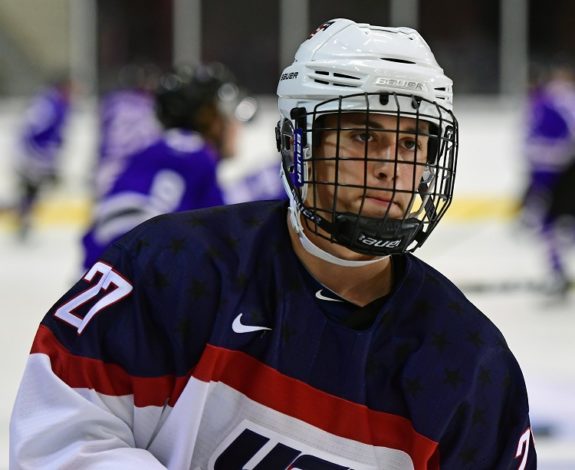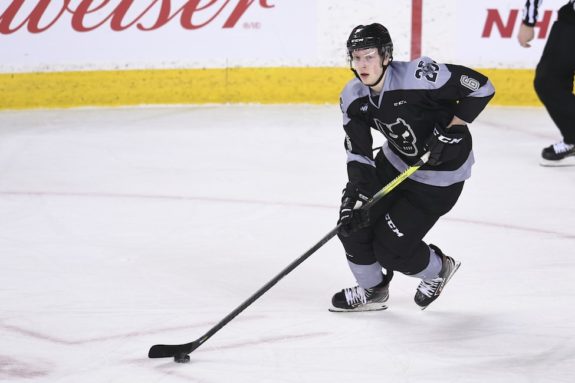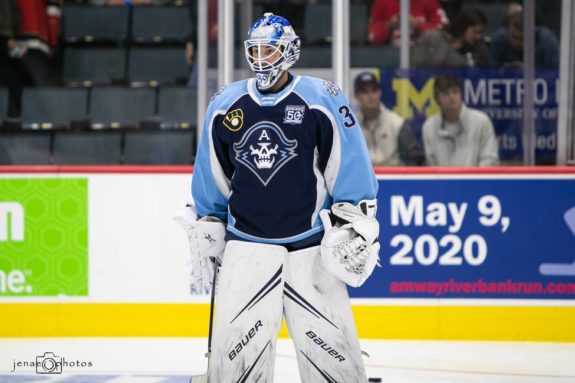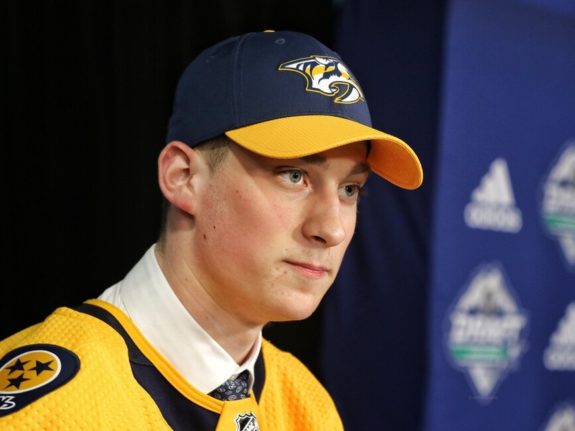In dealing with some leagues not running, other leagues managing around shutdowns and rescheduling, and everyone managing around their own health and isolation, it wasn’t an easy year to be a hockey prospect. Despite the hurdles, many Nashville Predators’ prospects handled themselves well and overcame those challenges to thrive on the ice. This is also the deepest the Predators’ pipeline has looked in a long time, with the team set up well for years to come. At the end of a challenging 2020-21 season for many of these prospects, let’s recap the current state of each position.
Defensemen
Would it really be a Predators article if we didn’t start with defensemen? The franchise has built its success over the years upon a foundation of excellent defensemen. Still, with Dante Fabbro struggling in his first full season and the core three hitting their 30s, the new generation is going to have to be along soon. We have seen glimpses of it, with Jeremy Davies and Alexandre Carrier playing more than a dozen games. They have acclimatized well to the NHL level, especially Carrier, who looks to be a part of the lineup for game one of the playoffs on Monday. Both are excellent skaters and have above-average offensive instincts. They are still learning the NHL game on the defensive side of the puck but have had success in their own end at the AHL level both this year and in seasons past.
Related: Predators Blue Line on Verge of Being Overcrowded
The crown jewel of the crop right now is the offensive-minded David Farrance, and the Predators managed to avoid losing him to free agency by signing him mere months before his rights were to expire. He is the future power-play quarterback and has nothing left to prove at the NCAA level after putting up monster offensive totals with Boston University. Between those three defensemen and power-play specialist Marc Del Gaizo showing some offensive flair at both the NCAA and AHL levels this season, the Predators’ defensive core looks to be one that will be pushing for a higher tempo of gameplay.

On the flip side, there are still a few of your prototypical stay-at-home defensemen in Luke Prokop and Vladislav Yeryomenko. Prokop was selected in the third round of last year’s draft, and he has more than justified that pick with his play this season. He has looked excellent in the WHL through 15 games, with some strong footwork to complement his monster 6-foot-4, 220-pound frame; he is a bit of a man among children there. He manages his gaps well, which will help ease the transition to pro hockey, and has also chipped in six points to boot.

Over in the KHL, Yeryomenko finished his second season at the top tier and has taken steps forward in all facets of his game. He is growing into a very reliable presence on his own end, while that calming presence has also allowed his passing abilities to flourish. He is signed in the KHL until the end of the 2022 season, at which time we might expect him to move to the AHL and continue his pro career in North America. At 6-foot-1, he doesn’t have the same imposing frame as Prokop, but he is nonetheless efficient in his own end and looks like he could make an excellent complementary player on a second pairing in the NHL sometime in the future.
Goalies
In great news off the ice, Connor Ingram returned after voluntarily participating in the NHL/NHLPA player assistance program. Ingram then took to the ice with the Chicago Wolves of the AHL, playing five games. He showed some rust, though, and wasn’t his usual self. However, with a full offseason to get back into game shape, he will hopefully be pushing for the backup job with the Predators next season. If he shows the same talent that helped him to a sub-2.00 goals-against average (GAA) and a .933 save percentage (SV%) in the AHL in 2019-20, he would be an excellent secondary piece in the crease behind the incumbent Juuse Saros.

The future of the net is all Yaroslav Askarov, though, who seems to shine at every single level except for the World Juniors. He put up almost inconceivable numbers again in the KHL this season: nine games, 1.21 GAA, .951 SV%, and one shutout. These are similar numbers to what Igor Shestyorkin was putting up in the KHL as a 23-year-old. With Askarov only turning 19 next month, he likely won’t be brought across the pond right away, but he shouldn’t need much more seasoning before he’s ready. Fortunately, the Predators have Saros and Ingram in the pipeline, and they don’t need to rush.
Also, in the system, the Predators have a few long-term projects in the sizeable Czechs Milan Kloucek and Tomas Vomacka, plus another Russian dominating their tier-two league in Konstantin Volkov. They also own the rights to American goaltender Ethan Haider, who has thrived in the USHL this season despite facing large volumes of shots. None of these goaltenders are likely to become NHL starters, but with goalies, you never know.
Forwards
Between the scoring of Eeli Tolvanen and the impacts of Tanner Jeannot and Matthieu Olivier on the extremely effective “Herd Line,” the forward prospects have been filling in well when needed. The next wave is coming fast, and there could be some spots open next season if the current UFAs are not re-signed.
The star up front is Philip Tomasino, who dominated the AHL and excelled at the World Juniors. He is a speedy player with an endless work ethic and a high offensive ceiling. He has nothing left to prove at the lower levels, and his toolkit speaks volumes about the likelihood of him managing the transition to the NHL well. He could very well be the center on the top power-play unit next fall.

The Predators also have an abundance of wingers in the system, most of whom likely top out as middle-six options (which is okay because Tolvanen and Filip Forsberg fill out the top line spots anyways). The top names include the hulking Egor Afanasyev, the slick Alexander Campbell, the speedy Rem Pitlick, and the energizer Luke Evangelista, who were all drafted in the first three rounds of the last two drafts.
Evangelista completely lost his OHL season but got a few games in with the AHL Wolves at the end of the campaign. Pitlick also thrived with the Wolves but struggled to score in his NHL call-up. Campbell excelled in the NCAA, while Afanasyev continued his development in the KHL, and both are progressing well. Pitlick and his strong underlying percentages in his 11 NHL games deserve a shot at a full-time roster spot, but none of the other three are likely to make the jump for the 2021-22 campaign, though they should be knocking on the door soon after.
Moving down the list a little, a couple of European centers in Jachym Kondelik and Juuso Parssinen both made offensive strides this season. Their upsides aren’t as high as Tomasino’s, but one or both could turn into a reliable middle-six center. Kondelik is especially appealing with his 6-foot-6 frame and excellent vision. On the wing, Isak Walther, Grant Mishmash, and Lukas Craggs could all push for bottom-six roles in the next few years, displaying a combination of physicality, responsibility, and skill in a cycle-style game. The current bottom-six for the Predators is relatively young, though, so there is no need to rush any of those kids to the show.
Future Outlook
The future of the Predators is in good hands, especially on the back end, which is important as the core three are all 30 this year, and Mattias Ekholm is only a year away from free agency. The goaltending will get some fresh blood after the decade of stability that Pekka Rinne provided, and the duo of Saros & Ingram is ready to take up the torch. The forward core doesn’t need a shakeup, but the veterans will find that they are being pushed for ice time over the next few years as the new wave grows. Tomasino’s arrival will have a large positive impact on the offense. At the same time, the wingers should be ready to cover off any expansion and free agency losses over the next couple of years. For all the questions about the present that the slow start this season caused, the future of the Predators is in good hands.